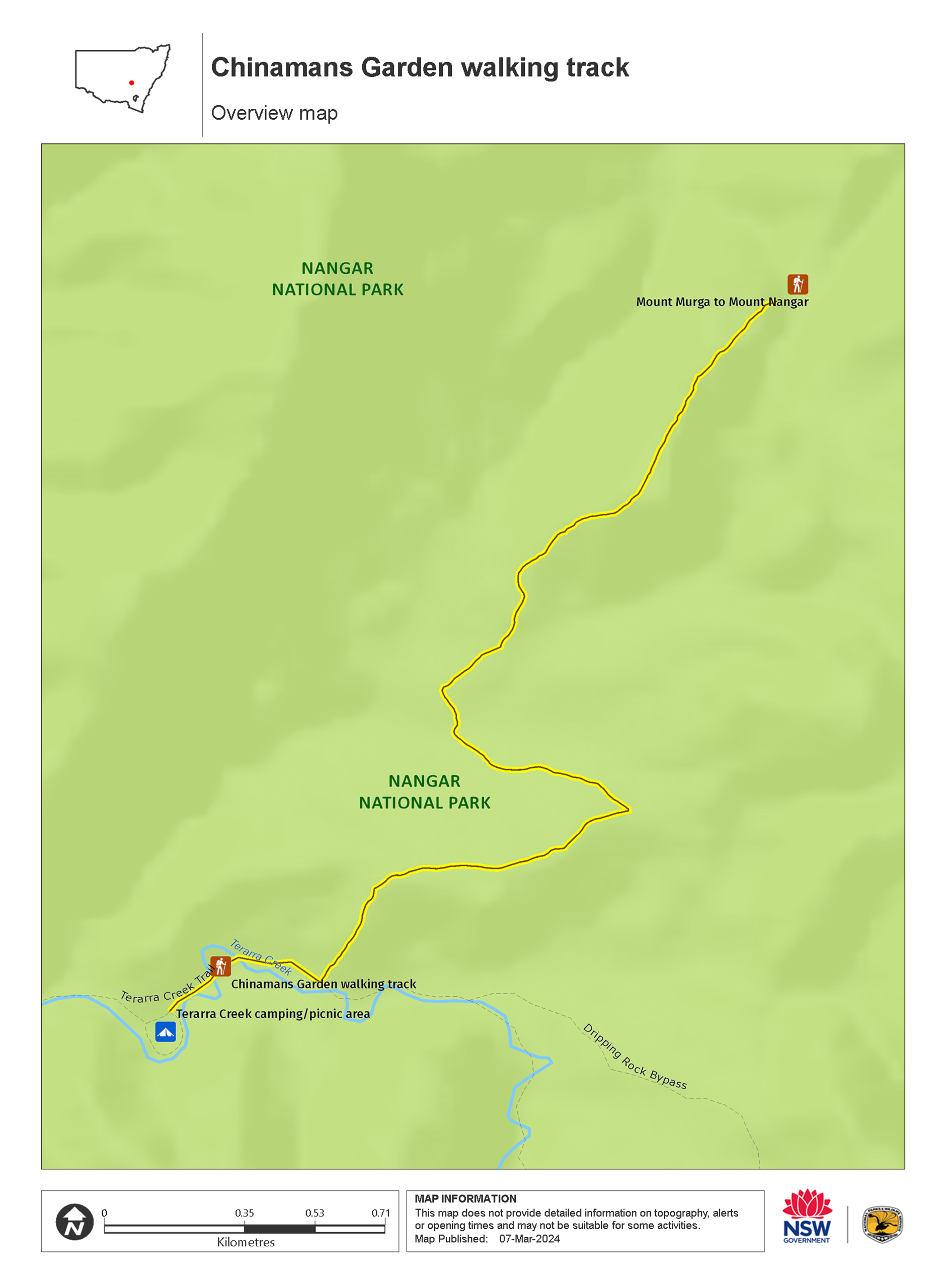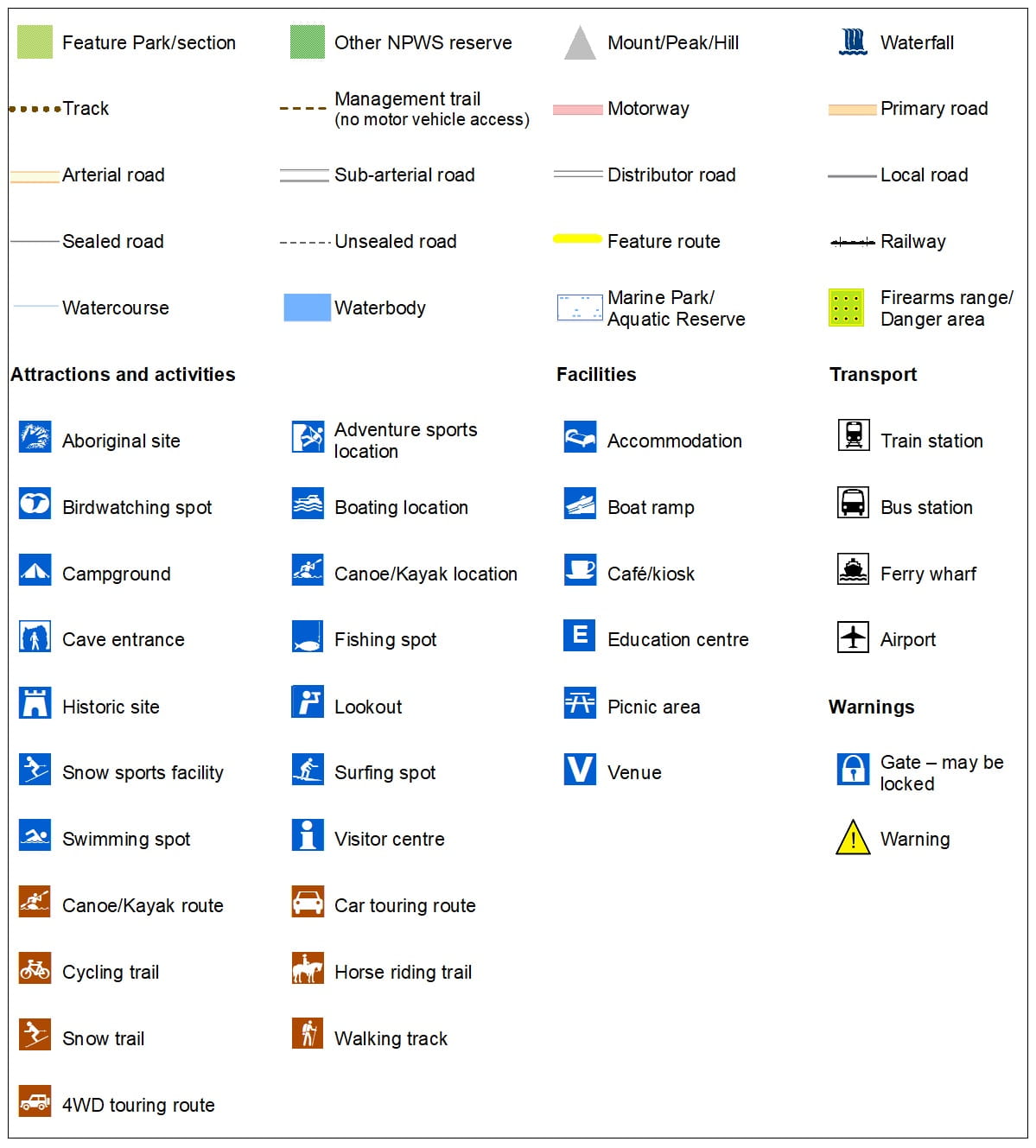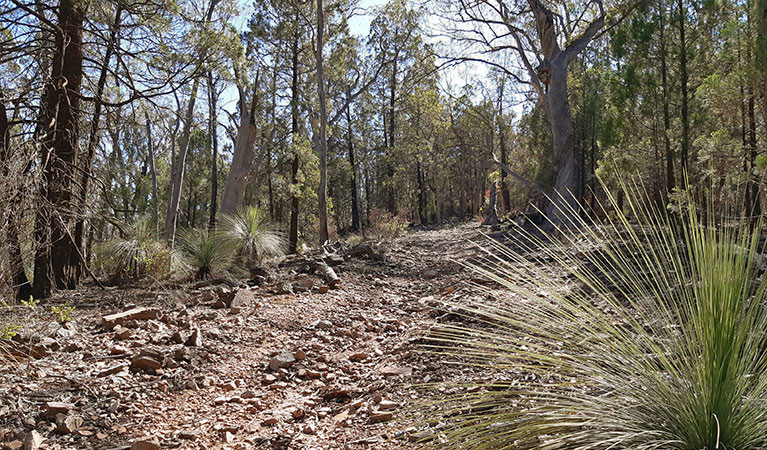Chinamans Garden walking track
Nangar National Park
Overview
Chinamans Garden walking track is a moderate hike from Terarra Creek campground, in Nangar National Park, west of Orange. It’s easily linked with longer walks to stunning Mount Nangar or Mount Murga.
- Where
- Nangar National Park in Country NSW
- Accessibility
- No wheelchair access
- Distance
- 7.4km return
- Time suggested
- 5hrs
- Grade
- Grade 4
- Trip Intention Form
-
It's a good idea to let someone know where you're going. Fill in a trip intention form to send important details about your trip to your emergency contact.
- What to
bring - Drinking water, sturdy shoes, suitable clothing, first aid kit, hat, sunscreen, snacks
- Please note
This walking track requires a moderate level of fitness.
This 7.4km return walk starts from Terarra Creek campground and picnic area. It’s a peaceful day walk and is easily combined with longer hikes to explore Nangar National Park’s scenic ridges and peaks.
From the campground make your way along Terarra Creek fire trail, lined with pink honeymyrtle blossoms in springtime. After 400m, follow signs for Chinamans Garden walking track. Keep an eye out for the old fence from a long-ago garden cultivated by Chinese miners, which gives this track its name.
Listen to birdsong in the treetops, as you wind your way uphill through whitebox, stringybark and scribbly gum woodlands. Bring your binoculars for a better chance to spot little lorikeets, turquoise parrots and spotted pardalotes. You may hear wallabies or kangaroos in the undergrowth, or even spot an echidna by the trail.
At the intersection with Mount Murga to Mount Nangar link track stop for a well-deserved rest before returning the way you came. For a longer hike, experienced, well-equipped bushwalkers can head 3.3km west to Mount Murga, or 4.8km east to reach Mount Nangar’s scenic lookout.
Fresh clear days in autumn, winter and spring are the best times for this walk. As the days grow longer, the landscape comes alive with a kaleidoscope of wildflowers, like nodding blue lilies and rusty spider flowers.
Nearby
-

Terarra Creek camping and picnic area
Centrally located and naturally sheltered, Terarra Creek camping and picnic area makes the perfect base for bushwalking, mountain biking, camping and picnicking.
-

Mount Murga to Mount Nangar loop walk
The Mount Murga to Mount Nangar loop walk combines some of the best hikes in Nangar National Park to give you a full day peak-to-peak experience.
Map

Map legend

Local alerts
For the latest updates on fires, closures and other alerts in this area, see https://www.nationalparks.nsw.gov.au/things-to-do/walking-tracks/chinamans-garden-walking-track/local-alerts
General enquiries
- National Parks Contact Centre
- 7am to 7pm daily
- 1300 072 757 (13000 PARKS) for the cost of a local call within Australia excluding mobiles
- parks.info@environment.nsw.gov.au
Park info
- in Nangar National Park in the Country NSW region
- Nangar National Park is always open but may have to close at times due to extreme weather or fire danger.
Visitor info
All the practical information you need to know about Chinamans Garden walking track.
Maps and downloads
Learn more
Chinamans Garden walking track is in Nangar National Park. Here are just some of the reasons why this park is special:
A refuge for wildlife

Amid the extensive farmlands of the central west, Nangar is home to many sedentary and migratory birds and local native animals. Among many bird species are several birds of prey such as the peregrine falcon, wedge-tailed eagle and brown falcon, which use the cliff face along the northern boundary for nesting and perching. The park is also home to the eastern grey kangaroo, common wallaroo, red-necked wallaby, swamp wallaby, little mastiff-bat and chocolate wattled bat. You may also spot the southern rainbow skink, eastern long-necked tortoise and spotted grass frog.
- Mount Murga walking track Enjoy scenic views, spring wildflowers, varied wildlife and birdwatching on Mount Murga walking track; great for a day of bushwalking near Orange and Forbes.
- Mount Nangar walking track Mount Nangar walking track to the lookout takes you bushwalking through varied landscapes to scenic views over Nangar National Park and surrounding farmlands in search of wildlife and wildflowers.
An ever-changing landscape

Ranging from the undulating hills in the south of the park to the long cliff line of red siltstone on the northern boundary - and the 770m-high Mount Nangar - the park offers a great variety of landscapes and views. Terarra Creek valley is open with wide creek flats and gentle slopes and the upper tributaries of Mogong Creek contains several natural springs. You'll see from the high vantage points of the park that the valley floor and more accessible lower slopes have been cleared by grazing and logging. Old growth forest is found in the steeper areas, but under national park protection, the park's vegetation communities will grow ever stronger.
- Mount Murga walking track Enjoy scenic views, spring wildflowers, varied wildlife and birdwatching on Mount Murga walking track; great for a day of bushwalking near Orange and Forbes.
- Mount Nangar walking track Mount Nangar walking track to the lookout takes you bushwalking through varied landscapes to scenic views over Nangar National Park and surrounding farmlands in search of wildlife and wildflowers.
Historic treasure

Gold was discovered around Eugowra in the 1860s, drawing miners and bushrangers, including the Gardener and Ben Hall gangs who roamed the area that the park now covers. Chinese miners lived here in the early 1900s, prospecting for copper. Historical remains in the park include remnants of gardens and orchards of Dripping Rock homestead, lost to fire in recent years, and its piggery, ruined hay shed and yards.
Wiradjuri country

A vast area of the central west of New South Wales, including Nangar National Park, is Wiradjuri country. Evidence suggests that Nangar Range has been an important landmark in Aboriginal culture and that the surrounding area was occupied for long periods. Places of significance include archaeological sites containing artefacts, stone scatters, quarries and scar trees.

